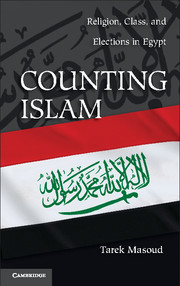Crossref Citations
This Book has been
cited by the following publications. This list is generated based on data provided by Crossref.
Benstead, Lindsay J.
Jamal, Amaney A.
and
Lust, Ellen
2015.
Is It Gender, Religiosity or Both? A Role Congruity Theory of Candidate Electability in Transitional Tunisia.
Perspectives on Politics,
Vol. 13,
Issue. 1,
p.
74.
Carrera, Flavio
2015.
¿De la Primavera al Verano Arabe?.
El Outsider,
Vol. 3,
Issue. ,
Yildirim, A. Kadir
and
Lancaster, Caroline M.
2015.
Bending with the Wind: Revisiting Islamist Parties’ Electoral Dilemma.
Politics and Religion,
Vol. 8,
Issue. 3,
p.
588.
Fisher, Netanel
2016.
THE FUNDAMENTALIST DILEMMA: LESSONS FROM THE ISRAELI HAREDI CASE.
International Journal of Middle East Studies,
Vol. 48,
Issue. 3,
p.
531.
Rougier, Bernard
and
Bayoumi, Hala
2016.
Egypt’s Revolutions.
p.
139.
Kalin, Michael
and
Siddiqui, Niloufer
2016.
Islam's Political Disadvantage: Corruption and Religiosity in Quetta, Pakistan.
Politics and Religion,
Vol. 9,
Issue. 3,
p.
456.
Eltantawi, Sarah
2016.
Religious Difference in a Secular Age: A Minority Report. By Saba Mahmood . Princeton: Princeton University Press, 2015. Pp. 248. $24.95 (paper). ISBN: 978-0691153285..
Journal of Law and Religion,
Vol. 31,
Issue. 3,
p.
401.
Brooke, Steven
2017.
From Medicine to Mobilization: Social Service Provision and the Islamist Reputational Advantage.
Perspectives on Politics,
Vol. 15,
Issue. 1,
p.
42.
Pahwa, Sumita
2017.
Pathways of Islamist adaptation: the Egyptian Muslim Brothers’ lessons for inclusion moderation theory.
Democratization,
Vol. 24,
Issue. 6,
p.
1066.
Attallah, May
2017.
The determinants of voting for Islamists in Egypt’s first post-revolution elections 2011–2012.
Middle East Development Journal,
Vol. 9,
Issue. 2,
p.
184.
Donker, Teije Hidde
and
Netterstrøm, Kasper Ly
2017.
The Tunisian Revolution & Governance of Religion.
Middle East Critique,
Vol. 26,
Issue. 2,
p.
137.
Hadiz, Vedi R.
2017.
Indonesia’s Year of Democratic Setbacks: Towards a New Phase of Deepening Illiberalism?.
Bulletin of Indonesian Economic Studies,
Vol. 53,
Issue. 3,
p.
261.
Karakoç, Ekrem
Köse, Talha
and
Özcan, Mesut
2017.
Emigration and the diffusion of political Salafism.
Party Politics,
Vol. 23,
Issue. 6,
p.
731.
Teti, Andrea
Xypolia, Ilia
Sarnelli, Viola
Tsourapas, Gerasimos
Lomazzi, Vera
and
Abbott, Pamela
2017.
Political and Social Transformations in Egypt.
SSRN Electronic Journal,
Vannetzel, Marie
2017.
The Muslim Brotherhood’s ‘Virtuous society’ and State Developmentalism in Egypt: the Politics of ‘Goodness’.
Revue internationale de politique de développement,
Vol. 8,
Issue. ,
p.
220.
Bou Nassif, Hicham
2017.
Coups and nascent democracies: the military and Egypt's failed consolidation.
Democratization,
Vol. 24,
Issue. 1,
p.
157.
Völkel, Jan Claudius
2017.
Sidelined by design: Egypt’s parliament in transition.
The Journal of North African Studies,
Vol. 22,
Issue. 4,
p.
595.
Drevon, Jerome
2017.
The Constrained Institutionalization of Diverging Islamist Strategies: The Jihadis, the Muslim Brotherhood, and the Salafis between Two Aborted Egyptian Revolutions.
Mediterranean Politics,
Vol. 22,
Issue. 1,
p.
16.
Tadros, Mariz
2017.
A political settlements lens onto Egypt’s critical junctures and cyclic violence (2011–2014).
Conflict, Security & Development,
Vol. 17,
Issue. 3,
p.
265.
Esposito, John L.
Rahim, Lily Zubaidah
and
Ghobadzadeh, Naser
2018.
The Politics of Islamism.
p.
1.



